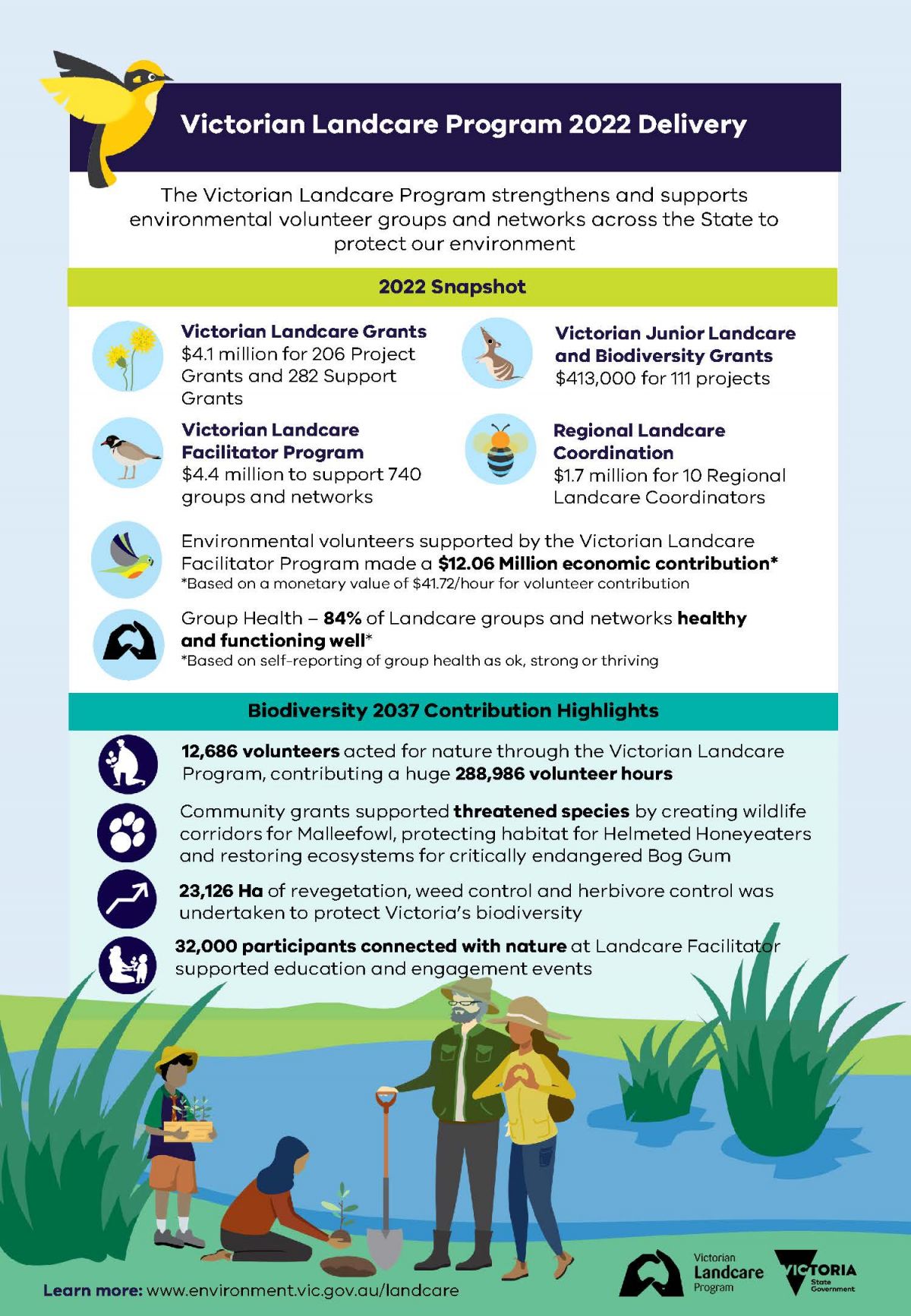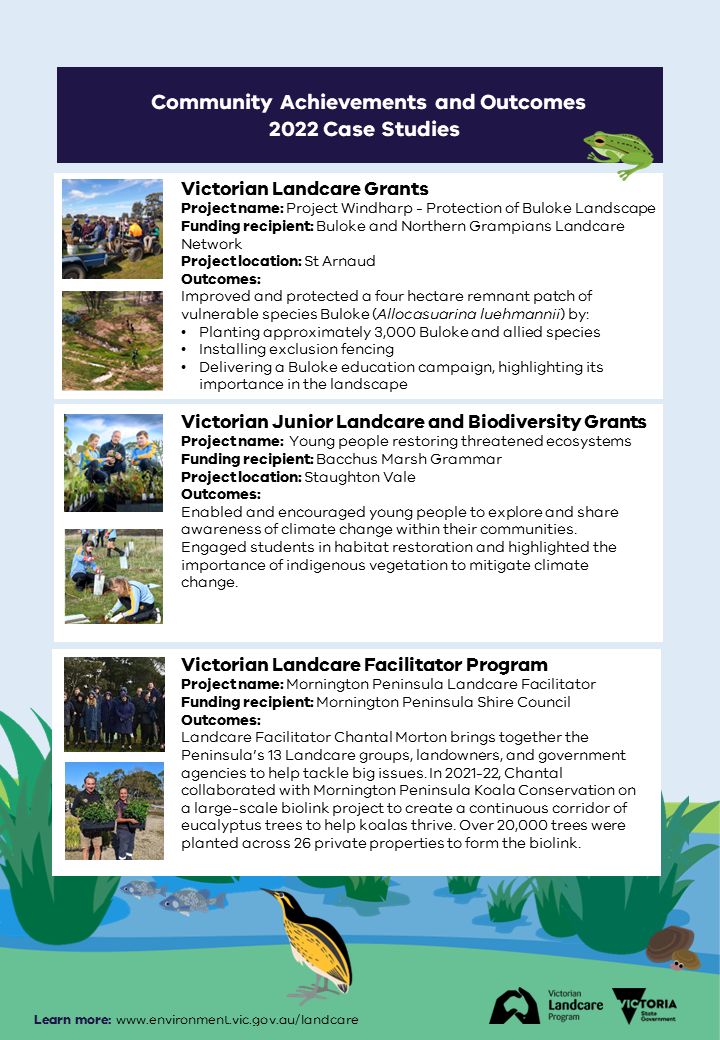Victorian Landcare Program
The Victorian Landcare Program provides supports Landcare in Victoria to strengthen and enable groups and networks across the State. Support includes funding Regional Landcare Coordinators and on-ground Landcare facilitators who empower locals to act for their environment, the Victorian Landcare Grants program and the Victorian Landcare Awards.
The Victorian Landcare Program supports 740 groups and networks around the state. To locate or find the contacts for a Landcare group or network near you, go to the Victorian Landcare Gateway website. Here you will also find news from Landcare groups and networks, including upcoming volunteer activities and events.
2023-24 Victorian Landcare Awards
The Victorian Landcare Awards are held every two years to celebrate and recognise the outstanding work done by our Landcarers and environmental volunteers in award categories that acknowledge the excellence of individuals, groups, networks, First Nations people, schools and other organisations in caring for Victoria’s land, water and biodiversity.
Main Dates
The main dates of the 2023-24 Victorian Landcare Awards are:
Nominations opened: Wednesday 18 October 2023
Nominations close: Friday 1 March 2024
Awards ceremony (Government House, Melbourne): TBC July 2024
Victoria Only Landcare Awards Categories
The five Victoria only Landcare Awards categories are:
- Joan Kirner Landcare Award
- Victorian Farmers Federation/Landcare Victoria Inc. Heather Mitchell Memorial Fellowship
- Dr. Sidney Plowman Travel and Study Award
- Landcare and Environmental Volunteer Group Award
- Landcare and Environmental Volunteer Network Award
The detailed criteria for the five Victoria only Landcare Awards categories visit here.
State & Territory Landcare Awards (national) Categories
The nine State and Territory Landcare Awards (national) categories are:
- Climate Innovation Award
- Coastcare Award
- Community Partnerships Landcare Award
- First Nations Landcare Collaboration Award
- Individual Landcarer Award
- Junior Landcare Award
- NextGen Landcare Award
- Sustainable Agriculture Landcare Award
- Women in Landcare Award
The detailed criteria for the nine State & Territory Landcare Awards (national) categories visit here.
Landcare Videos
Celebrating the LGBTIQ Friends of Bababi Djinanang Grasslands
In this heart-warming video, we follow the journey of Gabriel Aleksandrs, a Reservoir resident who found solace, connection, and purpose through his love of nature along the Merri Creek in Melbourne. Driven by a desire to heal and unite, Gabriel established the "LGBTIQ Friends of Bababi Djinanang Grasslands" Facebook group. What starts as a small endeavour quickly blossoms into a thriving community of like-minded individuals. The group not only focuses on environmental conservation but also becomes a safe haven for LGBTIQ individuals seeking meaningful connections beyond traditional spaces, while also connecting with nature.
The Power of Partnerships - How to maximise your impact together
Meet Chantal Morton, the Mornington Peninsula Landcare Facilitator, who's uniting 13 Landcare groups and landowners to create new koala habitat on Bunurong Country in the Mornington Peninsula. Collaborating with the Mornington Peninsula Koala Conservation, they've initiated a groundbreaking biolink project, planting over 20,000 trees across private properties. With funding from the Victorian Landcare Grants, this alliance aims to create a thriving eucalyptus corridor for Peninsula koalas, proving that partnerships can yield monumental results.
Plant & Dance - A Day out with Intrepid Landcare
These under-40 champions gathered for the 'Plant and Dance' Landcare event in South Gippsland. In just one epic day, they planted over 3,500 trees!This initiative proves that when you combine the power of community, music, and environmental action, you create an unforgettable experience that leaves a lasting impact on both the land and its caretakers.This project was supported through our Victorian Landcare Facilitator Program and a Victorian Landcare Grant to Gippsland Intrepid Landcare.
Seachangers & Treechangers - Encouraging new volunteers into Landcare
The Bellarine Coast experienced a post-pandemic population boom, and Sophie Small, Victorian Landcare Facilitator of the Bellarine Landcare Group, noticed a powerful trend – the community's newfound connection with nature for improved mental well-being. This video encapsulates the resilience, growth, and positive impact of Landcare on communities and the environment.
Tackling Natural Disaster: how Landcare facilitators can help
Meet Penny and Deb, who showed that even in the face of disaster, a united group of volunteers can create a greener, resilient future. Following the Black Summer fires in East Gippsland, Landcare volunteer groups worked together to help threatened species, including working to restore habitat for the glossy black cockatoo.
Victorian Landcare Program 2022 Achievements and Outcomes
Environmental volunteer and Landcare groups, networks and individuals supported by the Victorian Landcare Program achieved some incredible results in 2022. For example, 12,686 volunteers act for nature as part of the program, contributing a huge 288,986 volunteer hours with an economic value of $12.06 million. See our 2022 Victorian Landcare Program snapshot and Community Achievements and Outcomes Case Studies below.
Regional Landcare Coordinators
We value the work of Victoria's volunteer-based Landcare groups and networks, and recognise the important support provided to these organisations by professional Landcare staff.
Through the Victorian Landcare Program the department funds ten Regional Landcare Coordinator positions which are based in Catchment Management Authorities, and a statewide Aboriginal Landcare Facilitator position.
Back to top
Victorian Landcare Facilitator Program
The Victorian Landcare Facilitator Program (VLFP) funds part-time Landcare facilitators who are employed directly by a range of organisations including Landcare and environmental groups and networks.
The Landcare Facilitator's role is to enable the effective participation of Landcare groups and networks, landholders and the wider community in natural resource management activities that protect, enhance and restore the natural environment, and improve agricultural productivity.
The Landcare Facilitators also have a strong focus on building group and network capacity, rather than dependency, to enable groups and networks to become sustainable.
Find out more about the Victorian Landcare Facilitator Program.
The Department of Energy, Environment and Climate Action is undertaking a review of the current Victorian Landcare Facilitator Program. The review is considering strengths and challenges with current delivery, areas for improvement and future delivery options. Consultation is open from 31 January – 20 March 2024. To learn more about the review and have your say, visit Engage Victoria.
Back to top
Victorian Landcare Grants
The Victorian Landcare Grants support Landcare and other community-based natural resource management groups to protect and restore the Victorian landscape. The grants are delivered through the state's ten Catchment Management Authorities.
The grant program funds:
- on-ground works that deliver on local, regional and state priorities
- capacity building activities for land stewardship and on-ground change
- projects that promote innovation through experimental trials and pilot programs
- support grants to ensure a strong Landcare base across the state
- opportunities to promote Landcare and increase membership and volunteer numbers.
Find out more about the Victorian Landcare Grants.
Back to top
Victorian Junior Landcare and Biodiversity Grants
The Victorian Junior Landcare and Biodiversity Grants provide support of up to $5,000 to Victorian Schools, kindergartens, childcare centres, Scouts, Girl Guides and youth groups.
Funding is provided for projects that engage young Victorians in outdoor, hands-on, on-ground projects, and environmental learning activities.
These projects provide both environmental and educational outcomes, as well as health and social benefits.
The grants are funded through the Victorian Landcare Program and delivered by Landcare Australia as part of its Junior Landcare program.
Find out more about the Victorian Junior Landcare and Biodiversity Grants.
Back to top
Victorian Landcare and Catchment Management Magazine
The Victorian Landcare and Catchment Management magazine was first published in 1996.
The magazine is published three times a year and the stories are primarily contributed by community Landcarers.
The magazine is available in both hard copy or online on the Victorian Landcare Gateway.
To receive an email alert when the Victorian Landcare and Catchment Management magazine is available online, send an email to Landcare Victoria Inc.
Back to top
Landcare groups and networks
In Victoria there are now around 600 Landcare groups and 64 Landcare networks, and more than 500 other community-based natural resource management groups. Victoria’s Landcare and other environmental volunteer groups have around 60,000 members and involve an additional 45,000 volunteers who contribute their time and energy each year to help care for our natural resources.
The advantages of working in groups are:
- improved long-term productivity and amenity value of an area
- access to a wider range of technical, financial and other help
- community pride in and ownership of projects
- a sense of achievement
- public recognition of a group's efforts, which may encourage others to take part
Over time, Landcare has become more connected. While Landcare groups continue to operate at the local community scale, a large proportion of the State's groups are now linked to or members of Landcare networks, which operate at a broader or more strategic landscape scale.
Landcare groups and networks develop their own priorities, organise community activities, and source support and funding from entities including federal, state and local governments, catchment management authorities, private businesses, non-profit organisations, and individuals.
Key activities include undertaking on-ground projects, building partnerships, community capacity building and engagement, sharing stories and skills, and celebrating success. Landcare, therefore, is a partnership between production and conservation, with whole communities caring for the land – local councils, conservation groups, schools and interested individual.
Over the decades since its inception, Landcare has become part of the social fabric of Victoria. The public value of Landcare is significant. In addition to the environmental gains, major social and economic benefits are produced for participants and the communities in which they live.
Back to top
History of Landcare in Victoria
Landcare, born in Victoria in 1986, is a highly successful community-based volunteer movement that facilitates and coordinates actions to care for our environment. Landcare is about a simple idea; people organising to come together to discuss shared land management issues, and to design and implement practical solutions to take action to address these issues. People see results and want to be part of it. Landcare is community based leadership in action.
Landcare began when farming neighbours recognised that they could be more effective and have a greater impact if they addressed common natural resource management concerns together.
Since the first Landcare group was formed at Winjallok near St Arnaud in central Victoria, hundreds of Landcare groups have formed across Victoria. Landcare quickly became a national movement and in recent years it has expanded internationally to more than 20 countries.
Landcare has achieved success in nurturing a more sustainable land management ethos and practice. From its perennial roots in production agriculture, Landcare has branched out to encompass environmental citizenship of both public and private land - in the bush, along the coast, as well as in urban and peri-urban areas. Among the wide variety of on-ground activities undertaken by Landcare are: rejuvenation and repair of habitats, restoration of waterways, improvements to farmland, and addressing land management issues such as erosion and pest plants and animals.
Research affirms that the on-ground works undertaken by Landcare lead to improvements in the condition of our natural resources. What's more, these works are accomplished in a very cost effective way in terms of the on-ground actions achieved relative to the amount of public funds invested. This cost effectiveness is attributable to low coordination and administration costs, the provision of volunteer labour, and significant landholder contributions (both cash and in-kind) to projects.
Back to top
Landcare on public land
About 40 per cent of Victoria is public land such as national parks, forests and reserves that are managed by Government agencies.
While Landcare has traditionally worked on private land, some groups and networks also work collaboratively with public land managers to undertake projects on public land. Where land management issues overlap between public and private land, Landcare provides an opportunity for private and public land managers to work together to tackle these issues.
Back to top
Page last updated: 22/03/24

